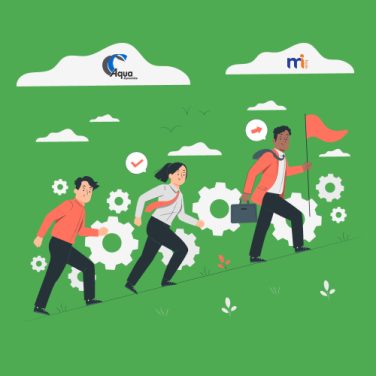Digital HR transformation is reshaping how HR departments operate today, turning traditional HR practices into streamlined, flexible, and data-driven processes that better serve both employees and organisations.
With technology playing a pivotal role in transforming HR from a support function into a strategic partner, digital transformation helps align talent acquisition, employee engagement, and productivity with overarching business objectives.
Given that a digital HR transformation journey requires a methodical approach, beginning with strategic planning, MiHCM spoke to renowned HR transformation expert, automation enthusiast, and investor Akshat Joshi, who outlined the HR digital transformation roadmap, showing the way forward for corporates looking to transform and thrive.
Akshat is the CEO of Lighthouse Consulting and specialises in HR transformation, people analytics and digital HR solutions. He has worked for clients across diverse sectors from manufacturing and energy to aviation and telecommunications in the Asia Pacific region.
Here, Akshat explains the what, why, and how of digital HR transformation.
What is HR transformation?
To start off, in layman’s terms, what is HR transformation all about and why is it important?
That’s a great question. HR transformation, in the simplest terms, is about improving the efficiency and effectiveness of the HR department.
By efficiency, of course, I mean doing more with less. This means more efficient processes and more streamlined workflows, where technology and automation play a big role, therefore bringing down the cost of delivering HR services.
But that’s not where it stops. The effectiveness part is just as important. This is about setting the right HR strategies – be it recruitment, time management, or employer branding, and so on.
Organisations need to figure out what their priority areas are and what will give them the best business outcomes. HR transformation is important because to have good business outcomes, you need a solid people strategy, technology, foundation, etc.
Key components of successful change management
What are the key components of a successful change management strategy when it comes to digital HR transformation?
Change management is probably the secret sauce of HR transformation.
When we talk about HR transformation, we tend to overthink strategy, processes, policy, and technology. But the fact is that most organisations have been working in a certain way for many, many years and when you try and change that, when you try and change the way people work, there is resistance.
Everybody is afraid of change, or at least concerned, right? Therefore, change management – letting people know why this is good for you, why this will be a better way of doing things – is a crucial role in HR transformation success.
The role leadership plays
What role does leadership play in driving and supporting this transformation?
Almost central to it. When we talk about HR transformation, we’re not just talking about the HR department here; remember, HR actually serves everybody in the organisation.
Leaders have to not just endorse change but be seen advocating for the change. They have to explain to their employees why things are being changed, why this is good for them, and why it’s good for business and so they have to put their weight behind it.
At the same time, there are some decisions that can be complicated – especially on the process design side of things – and that’s where leaders play a very important role by basically being fearless and open to new ideas and therefore saying, ‘we will change; this is a new way of doing things, and we endorse that’.
Digital HR transformation challenges
What are the main challenges you come across in digital HR transformation and how do you overcome them?
One of the biggest challenges is accepting the new ways of doing things.
When you start an HR transformation programme, you start with the best of intentions. What happens many times is that when you look at the leading practices and you look at the new ways of working, they can appear to be quite different from how you do things today. That can create some kind of friction in the organisation. So that is one big challenge.
The other challenge can be more on the technology side of things, on the data. We have all the great technology in the world now, but if your data is not clean, if your fundamentals are not there, it becomes difficult to get the maximum value from your technology investment.
I always say focus on the change management part of it and on the data part of it, the technology is okay. We can implement the technology if we have those two things covered.
Defining success in digital HR transformation
That’s another good question. Success depends on the organisation and the definition of success.
When you start an HR transformation programme, it’s very important to be clear about the primary object: why are you doing this?
An organisation is investing its time and money behind the transformation programme. It’s not always just about efficiency and cost reduction. That’s a misconception.
If your stated objective is cost reduction, then you’ll measure the cost of running HR before and after. But it could be more things. It could be a growth-related agenda.
Let’s say your organisation is going to hire a lot of people. You’re going to multiply and grow and you’re going to enter new markets. In that case, maybe it’s about how quickly you’re able to recruit and how effective your recruitment is. It could be about performance management, or it could be about succession planning.
So initially, when you start an HR transformation programme, my advice always is to be very clear on what your primarily objective is as an organisation – why you are doing this – and that should give you the measure of success, a ‘before’ and ‘after’ kind of a measurement.
Ensuring employee buy-in and engagement
What strategies do you use to ensure employee buy-in and engagement and how do you measure the impact of digital transformation on employee satisfaction and productivity?
Buy-in and engagement is firstly all about understanding what the impacts are. Understanding the change impacts deeply, understanding what it means for the various stakeholder groups, and then communicating.
So let there be no secrets; let your employees know what’s coming and why it’s coming – here’s the benefits for you and here’s how things will change for you. I think having that early communication and leadership support are extremely important. That’s how you can generate buy-in and engagement.
Influencers and change agents play a big part of this. Within the organisation there can be many opinion leaders, people who are well respected, and if they are seen advocating for the change, usually employees will get behind it.
MiHCM solutions
I have been associated with MiHCM for a couple of years now. MiHCM as a technology is every bit as good as – and on par with – the leading solutions out there. In terms of the value that it gives you, I think it’s exceptional.
What I find extremely interesting about MiHCM is the fact that it’s integrated into the Microsoft ecosystem so well, so if you already have a Microsoft ecosystem, the integration is excellent.
Then there are the new investments that MiHCM has made on the Artificial Intelligence (AI) side of things – previously it was MiA, the chatbot, which is pretty good; now there’s SmartAssist as well, which I think is amazing in terms of how we can get to the next level of analytics with it.
All these investments into new areas and constantly keeping MiHCM software updated in the market are a great thing.
Technologies driving transformation and automation
Moving on to technologies of today and looking to the future, what are the most critical technologies driving digital HR transformation and automation now and what emerging trends that you see?
At the moment, there is a little bit of a rebalancing going on when it comes to technology.
Of course, I have to say, Artificial Intelligence – everybody’s mentioned it and it’s the buzzword of the day. I think that will happen, but maybe not now.
What’s happening now is that organisations that have already invested in HR transformation, in technologies, are reassessing if they need to upgrade the way they do things today, so there’s a lot of automation going on at the moment. I think AI is on the horizon, actually, so it’s not a million years away. It’s probably a few years away.
I think things will change quite dramatically when we have the more powerful AI engines available. When they make commercial sense, I think things will change quite dramatically.
Advice to HR professionals on digital transformation
To close, it’s time for some advice from the expert. What advice would you give to HR professionals looking to embrace digital transformation?
Well, I think these are very exciting times to be in the HR profession. HR used to be a control and administration function, that was it. It was just payroll and time and attendance. Those days are gone. It’s a strategically important function now. Your people strategy matters a lot.
There’s also a lot of opportunity to learn new things in the world of HR. We just talked about how automation and AI might change the game quite a bit. There are a lot of upskilling opportunities available here. It’s not the HR of 10 or 20 years back, which was more or less mindless number crunching and processing.
There are a lot of learning opportunities in the world of HR and my advice is to HR professionals would be to be in touch with technology and be in touch with the latest trends and developments – there are a lot of learning opportunities here.



